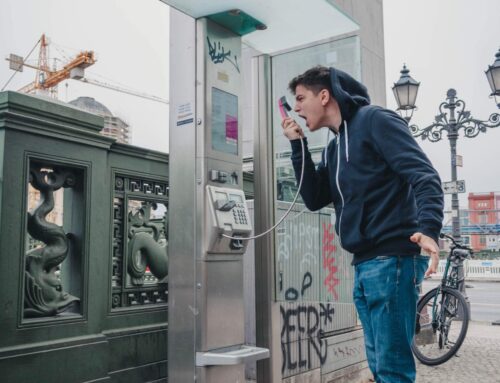My friend Robert told me why he chose emotionally unavailable partners.
“No parent wants to inflict pain on their children but sometimes they can’t help it. My mother had untreated bipolar disorder, suffering from bouts of depression and mania. My dad was helpless in the face of her episodes so he shut down, exploding in anger which made mom worse. Every day was scary. As a result, my sister and I became the parents in our family, with me forging permission slips, mowing the lawn and making sure there was food and my sister doing most of the cooking and cleaning. We were highly attuned to their outbursts, believing we must have done something to bring it on. And despite everything, we both replayed our childhood by marrying people we had to take care of.”
“Of course, I didn’t realize any of that until my 11-year-old son asked, ‘Why is Mom always mad at us? I forgot to take the trash out last night and she threw a glass at me, screaming for an hour.’ While listening to him, I felt like a failure. My three children suffered because I had married a woman that was a combination of my parents. On a subconscious level, I just didn’t want to deal with my wife. I could ignore her behavior because my work took me on the road most of the time, but my children couldn’t escape.”
Robert’s story demonstrates how he was conditioned by his family of origin to accept abusive behavior and how the family’s trauma passed to the next generation. His three children respectively developed unhealthy coping styles as they grew. His eldest, the perfectionist, was confrontational and drank too much. His middle child, starved for attention, clung to Robert and failed to launch in life. The youngest, although compliant, avoided everyone by using work as an excuse. All of them, including Robert, evaded conflict and had trouble establishing appropriate boundaries with people. Although he eventually divorced, it took years for him to heal and to help his children with the aftermath through therapy.
When he told me how guilty he felt for not leaving sooner, I responded, “When you’re in the eye of the storm, you don’t see the wreckage around you. Only when you leave, do you see the destruction.”
So Why Would We Keep Choosing Emotionally Unavailable Partners?
Our first attachments are established by our parents and caregivers and this molds our view of the world and how we interact with others. If we grew up with emotionally or physically abusive parents, neglectful caregivers, or were with toxic partners later in life where unpredictability and instability were key factors in the home environment, there is a much higher chance that we will choose similar relationships as Robert did.
So it’s necessary to do an honest inventory of previous romantic partners as well as our relationships with friends and family to understand if there is a pattern that we’re not seeing that keeps us away from good people.
So How Do You Break the Cycle?
- Imprinting and Personal Will — If you have determined that you’re repeatedly choosing “emotionally unavailable” people because of the past, you will have to overcome whatever negative pattern that was established from your childhood or previous relationship. Without the deliberate decision to heal, your mind will continue to return to what is familiar. And we will re-enact the behavior that we know subconsciously. For example, if a parent constantly told his daughter she was fat, she may struggle with weight later on and be with someone who berates her until she addresses that subliminal imprint. Or if a previous partner repeatedly told you that you’re worthless, you may have trouble proving to yourself that you are strong. We have to break these patterns before we can move on because no one will love us more than we love ourselves.
- Environment — All the therapy, prayers, and affirmations in the world are useless if you remain in a toxic environment. Environment will always trump our best intentions. And if anyone repeatedly destroys your self-confidence, no amount of help will heal that constant programming in our minds until we leave.
- Friends matter — Look at your closest friends. They will reflect what you value most, what you are avoiding, and what you believe in. Since they are one of the biggest influences of our lives, choose wisely. Surround yourself with good people who exemplify honest, healthy relationships, who support your growth and development. Because our very best friends will tell us the uncomfortable truths about ourselves and still be there at 3 a.m. with the Kleenex and coffee when we need them. Although we can’t choose our families or past, we can choose our friends.
- Remove the Bad Patterns — Whether you work with a mentor, coach or therapist, make sure they are qualified for your specific situation. Let them help you see where the negative habits come from. For example, you may ask for help with time management but the underlying issue is that you have inappropriate boundaries. This causes you to accept everyone’s request for help because you fear abandonment, leaving you with no time for your own needs. Or maybe you’re working on trying to be present in the moment but the real issue is avoiding your feelings by seeking distractions. If we can identify these types of patterns in ourselves, they can be a clue to what’s keeping us from emotional intimacy with others.
- Nourish your heart — What makes you feel alive? What gives you joy? What is your passion? Sometimes we don’t even know and we need to rediscover ourselves to find out. And that’s o.k. Take your time and try new things. Go out of your comfort zone and be open to fun and spontaneity. Living a life without fear is the best way to stop these old patterns.
- Forgive yourself for not seeing the cycle — So many of us, like Robert, feel guilty for repeating the cycle or not seeing it. You can only know what you know when you know it. And that process cannot be rushed. So please hold yourself with compassion during this time of growth.





